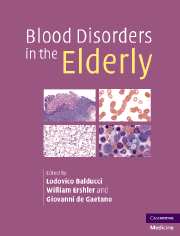Book contents
- Frontmatter
- Contents
- List of contributors
- Preface
- Part I Epidemiology
- 1 Epidemiology of aging
- 2 Epidemiology of anemia in older adults
- 3 Cancer in the older person: a comprehensive approach
- 4 From fitness to frailty: toward a nosologic classification of the older aged person
- Part II Hematopoiesis
- Part III Anemia of aging
- Part IV Hematologic malignancies and aging
- Part V Disorders of hemostasis in the elderly
- Index
3 - Cancer in the older person: a comprehensive approach
from Part I - Epidemiology
Published online by Cambridge University Press: 21 October 2009
- Frontmatter
- Contents
- List of contributors
- Preface
- Part I Epidemiology
- 1 Epidemiology of aging
- 2 Epidemiology of anemia in older adults
- 3 Cancer in the older person: a comprehensive approach
- 4 From fitness to frailty: toward a nosologic classification of the older aged person
- Part II Hematopoiesis
- Part III Anemia of aging
- Part IV Hematologic malignancies and aging
- Part V Disorders of hemostasis in the elderly
- Index
Summary
Introduction
Cancer is a very common disease of the older adult; it is primarily a disease of the elderly, with a high index of mortality and disability. The definition of “elderly” is somewhat arbitrary. The medical literature and epidemiologic data typically characterize the population as older than or younger than 65 years. Some studies, however, label patients as “older” when they are over 75 years and further categorize those patients over 85 years as the “oldest old”.
By the year 2030, one in five Americans will be older than 65 years. The number of individuals over 75 will triple, and the number of those over 85 will double in the same period. Currently the average life expectancy for a 75-year-old individual is 11.3 years, and for an 85-year-old it is 6.3 years. As the size of the elderly population continues to increase, healthcare professionals can expect to see a steadily growing number of elderly patients with cancer.
Cancer deaths accounted for 23% of all deaths in the USA in 2002, second only to heart disease. This major public health problem disproportionately affects older rather than younger persons. Increasing age is directly associated with increased rates of cancer, corresponding to an 11-fold greater incidence in persons over the age of 65 years.
- Type
- Chapter
- Information
- Blood Disorders in the Elderly , pp. 21 - 38Publisher: Cambridge University PressPrint publication year: 2007



